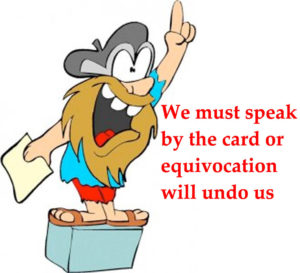 “We must speak by the card or equivocation will undo us.”
“We must speak by the card or equivocation will undo us.”
(Hamlet, act 5, sc. 1)
Comments. Two historians separated in time by millennia said the same thing, A historian must describe things “as they happened” (wie es eigentlich gewesen), according to Ranke (author of the monumental History of the Popes). Much earlier on Herodotus said, “I narrate what was” (ton eonta). That is, the historian, (and, we could say, even more so the politician), should be urged to stick to facts.
However, maxims, like many other declarations, often owe their success to their ambiguity. Or, to link the idea to Hamlet’s comment, maxims or declarations are often willfully repeated without questioning their meaning. And this purposely so to avoid scrutiny, because scrutiny would uncover equivocation and undo their value and effect.
Take the case of the famous pledge of allegiance. It was written in 1892 by Francis Bellamy, a Baptist minister and a Christian socialist. A socialist? Isn’t there enough to smell a rat?
The pledge was then published in the magazine “Youth’s Companion” by James Upham, a marketer for the magazine. Upham designed a campaign to instill the idea of American nationalism by selling flags to public schools and magazines to students. Nothing wrong in making a profit, of course, but idealism marketed to children and married to profit doesn’t smell that good. Let’s overlook this.
Not many know that until 1942 the salute accompanying the pledge was the Nazi or Fascist salute. Why change it? Of course you will say, not to be confused with you-know-who. But then were the you-know-who wrong in proclaiming their own allegiance to their nation and to you-know-what?
Jump to 1954 when the additional clause “one Nation under God, indivisible, with liberty and justice for all” was added. How about the deists, the pagans, the agnostics and the atheists? Are they disloyal to the Republic? What is loyalty? To do what the rulers command you to do? Including the invasion of other countries? Torturing people?
It may not hurt to think about these matters next time we attend a ceremony involving the choral, choreographic declamation and declaration of the pledge of allegiance.
In summary, contrary to Hamlet’s suggestion, let us NOT speak by the card. And let’s have a lot of EQUIVOCATION, because without it we are undone.
All entries on this site are derived from the book “Your Daily Shakespeare”. It contains 1390 pages identifying over 10,000 daily situations. Each situation directs you to one or more Shakespearean repartees, comments, and answers. Repartees, comments, and answers that will get you on the stage or at least out of the water – besides making you a regular winner of verbal contests. “Your Daily Shakespeare” has been described as the most unusual, useful and unique book of Shakespearean quotations. Nothing similar exists or has ever existed.
If you like this website why not subscribe (see last menu item to the right)? You will get automatically any new blog as well as any other information and novelty that will be forthcoming, including a system to effortlessly (yes) remember hundreds of Shakespearean quotes by heart while having fun in the process. You can also chat with me – please go to the chat-page. And I promise, no sales calls, trade leads, venomous schemes, hidden plots, Machiavellian conspiracies, commercial ploys, psychological tricks, leads exchanges, barter proposals, suggestions or offers of any kind imaginable (and unimaginable).
In the play. Hamlet to Horatio, referring to a witty gravedigger who is preparing Ophelia’s grave. Ophelia having become mad has drowned herself in a river nearby.
Image source: http://bargainbabe.com/2009/06/08/thank-you-readers-2/public-speaking-cartoon/

